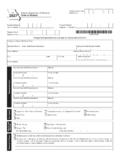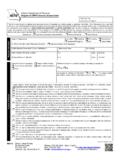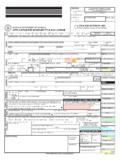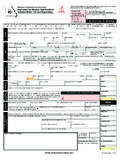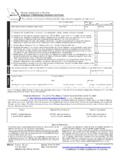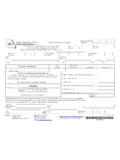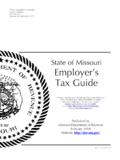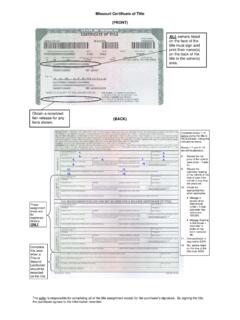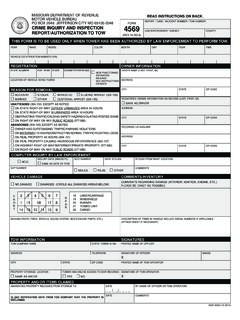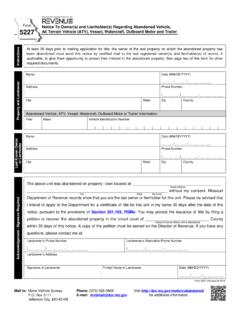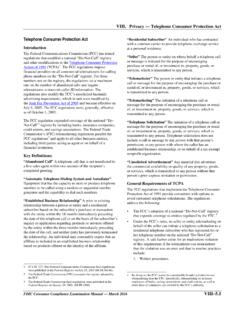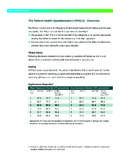Transcription of 4890 -Local Government Tax Guide - Missouri
1 Local Government Tax Guide Form 4890 (Revised July 2020) OVERVIEW .. 1 NOTIFICATION REQUIREMENTS OF RECENTLY ENACTED TAXES SALES TAX 2 LOCAL OPTION USE 2 DISTRICT 3 ANNEXATION SALES TAX .. 3 TAX DISTRIBUTION 4 FLOW 5 STATE TAX AND FEE DISTRIBUTION .. 6 ST. LOUIS COUNTY CIGARETTE 6 ANNEXATION MOTOR VEHICLE SALES TAX, MOTOR FUEL TAX, MOTOR VEHICLE FEE 7 SALES AND USE TAX DISTRIBUTION DETAIL 7 FINANCIAL INSTITUTION 8 ENSURING TAX 9 FREQUENTLY ASKED 11 APPENDIX LOCAL SALES/USE TAX A-1 MOTOR FUEL TAX, MOTOR VEHICLE SALES TAX, MOTOR VEHICLE FEE INCREASE, ST.
2 LOUIS COUNTY CIGARETTE TAX STATUTES, RULES, STATE A-2 TABLE OF CONTENTS - 1 - SALES TAX Sales tax is imposed pursuant to Chapter 144, RSMo, on the purchase price of tangible personal property and certain taxable services sold at retail. All sales of tangible personal property and taxable services are generally presumed taxable unless specifically exempted by law. Each business is assigned a jurisdiction code to be a unique code encompassing a city (if business is within city limits), county, and any applicable districts to identify the correct sales tax rate. Persons/Businesses making retail sales collect the sales tax from the purchaser and remit the tax to the Department of Revenue.
3 The state sales tax rate is , which is distributed into four funds: General Revenue (3%); Conservation ( ); Education (1%); and Parks/Soils ( ). Cities, counties, and certain districts may also impose local sales tax; therefore, the amount of tax businesses collect from the purchaser depends on the combined state and local rate and the location of the seller. Special taxing districts (such as fire districts) may also impose additional sales tax. Generally, the Department of Revenue collects and distributes only state and local (city, county, and district) sales tax.
4 The seller remits state and local sales tax together to the Department of Revenue, who in turn, distributes the local sales tax to the cities, counties, and districts. USE TAX Use tax is imposed on the storage, use or consumption of tangible personal property in this state. The state use tax rate is Cities and counties may impose an additional local use tax. The amount of use tax due on a transaction depends on the combined (local and state) use tax rate in effect at the Missouri location where the tangible personal property is stored, used or consumed. Local use taxes are distributed in the same manner as sales taxes.
5 Unlike sales tax, which requires a sale at retail in Missouri , use tax is imposed directly upon the person that stores, uses, or consumes tangible personal property in Missouri . Use tax does not apply if the purchase is from a Missouri retailer and subject to Missouri sales tax. Missouri cannot require out-of-state companies that do not have nexus or a "direct connection" with the state to collect and remit use tax. If an out-of-state seller does not collect use tax from the purchaser, the purchaser is responsible for remitting the use tax to Missouri .
6 A seller not engaged in business is not required to collect Missouri tax but the purchaser in these instances is responsible for remitting use tax to Missouri . A purchaser is required to file a use tax return if the cumulative purchases subject to use tax exceed two thousand dollars in a calendar year. Cities, counties, and certain types of districts may also impose local use tax. However, the rate of local use tax must always equal the local use tax rate currently in effect and imposed by that city, county, or district. If you have questions or concerns regarding city, county, or district tax issues contact: Email: Mail: Taxation Division Box 3380 Jefferson City, MO 65105-3380 Telephone: (573) 751-4876 Fax: (573) 522-1160 OVERVIEW - 2 - Cities, counties, and districts must notify the Department of Revenue within ten days of adoption or ordinance/order (by certified mail) of recently enacted local sales/use tax at: Taxation Division, Local Tax Unit, Box 3380, Jefferson City, Missouri 65105-3380 as follows.
7 For inquiries contact: (573) 751-4876. CITY AND COUNTY SALES TAX REQUIRED STEPS/ DOCUMENTS: Submit the following by certified mail to the Department of Revenue: Original signed ordinance/order that must include: City/County name imposing the tax; Missouri statute authorizing tax; Percent of increase or extension; Usage of the revenue; Effective date and expiration date of ordinance/tax; and Clearly state if the new tax applies to Domestic Utilities (if applicable). Certified copy of election results; Copy of the official ballot; Provide the name, title and address to where all future correspondence, and distribution payments concerning this tax should be sent.
8 DEPARTMENT OF REVENUE STEPS: - Verify the information provided by the city or county; - Send a confirmation letter documenting the effective date of the tax; - Request an Automated Clearing House (ACH) Agreement, which must be completed and returned for distribution purposes; and The city/county must return the new/revised completed agreement on or before the 15th day of the month prior to the effective date of any new tax imposed. EFFECTIVE DATE: - New Local Sales Tax: Effective on the first day of the second calendar quarter following Department of Revenue notification. - Extension of Existing Local Sales Tax: Effective on the first day of the first calendar quarter following Department of Revenue notification.
9 LOCAL OPTION USE TAX REQUIRED STEPS/ DOCUMENTS: Submit the following by certified mail to the Department of Revenue: Original signed ordinance/order that must include: City/County* name imposing the tax; and Effective date and expiration date of ordinance/tax. Certified copy of election results; and Copy of the official ballot. *A city or county may impose the local option use tax if a local sales tax is imposed. Local option use tax: - Must be imposed at a rate equal to the rate of the local sales tax in effect; - Will automatically be reduced or raised according to the changes in the sales tax rate; and - Information must be received 45 days prior to the start of a new quarter.
10 DEPARTMENT OF REVENUE STEPS: - Update the tax rate records for each business with a location within the city or county; - Request an Automated Clearing House (ACH) Agreement, which must be completed and returned for distribution purposes; The city/county must return the new/revised completed agreement on or before the 15th day of the month prior to the effective date of any new tax imposed; and Send a confirmation letter documenting the effective date of the tax. EFFECTIVE DATE: - New Local Option Use Tax: Effective on the first day of the calendar quarter that begins forty-fiv e (45) days following Department of Revenue notification.
